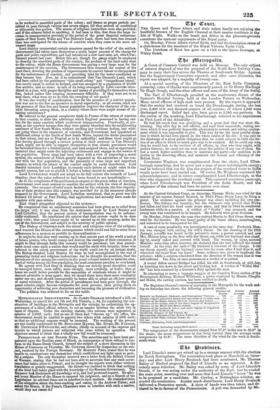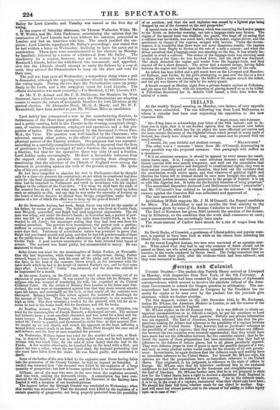'be larobincts.
Lord Lincoln's name got mixed up in a strange manner with the election for North Nottingham. The nomination took place at Mansfield on Satur- day; and after Lord Henry Bentinck had been nominated, Mr. Thomas Bailey of Basford proposed the Earl of Lincoln as an opponent. A dis- orderly scene followed. Mr. Bailey was asked by some of Lord Lincoln's friends, if he was acting under the authority of the Earl: but he evade& the main point, asserting ever and anon that Lord Lincoln " knew "he was to be proposed as a candidate. Mr. Cowley, a Nottingham solicitor, se- conded the nomination. Amidst much disturbance, Lord Henry Bentinck delivered a Protection speech. A show of hands was then taken, and de- clared to be in favour of the Protectionist. A poll was demanded by Mr.
Bailey for Lord Lincoln; and Tuesday was named as the first day of voting.
In the course of Saturday afternoon, Sir Thomas Walleaden White, Mr. S. W. Welfitt, and Mr. John Parkinson, entertaining the opinion that the nomination of Lord Lincoln had been without his sanction, proceeded to London and had an interview with him. The result justified the sus- picion: Lord Lincoln repudiated Mr. Bailey's proceedings; and stated that he had written a letter on Wednesday, declining to have his name put in nomination. These facts were communicated to the electors on Monday, by handbill; followed by a notice of withdrawal from Mr. Bailey. The machinery for a contest, however, was put in motion by Lord Henry Bentinck's friends, before the withdrawal was announced; and, apprehen- sive lest the Liberals should attempt to carry the fortress by a coup de main, they advised the Protectionists to keep on the alert and vote for their man.
The poll was kept open all Wednesday; a compulsory thing when a poll is demanded, although the opposing candidate should be withdrawn before the voting begin. During the two days the Protectionists came up pretty freely to the booth, and a few stragglers voted for Lord Lincoln. The official declaration was made yesterday—For Bentinck, 1,742; Lincoln, 217.
As Mr. T. D. Adana and Mr. F. H. Dickinson, the Members for West Somerset, have refused to resign their seats, the Protectionists are adopting means to secure the return of acceptable Members for both Divisions at the general election. Sir Alexander Hood, Mr. G. A. Moody, and Mr. W. F. Knatclibull, have been invited to join Mr. William Miles as candidates.
Lord Ashley has commenced a tour in the manufacturing districts, in furtherance of the Short-time question. Preston was visited on Tuesday; and a public meeting, held in the Theatre in the evening, comprised clergy- men, of various denominations, employers and operatives, and a fair pro- portion of ladies. The chair was occupied by the Reverend J. Owen Parr, MA., the Vicar. The question was well-handled by the Chairman; who adverted, among other points, to the effects of protracted labour on the physical powers of the Factory workers. One pregnant fact was repeated: according to a carefully-compiled mortality-table, it appeared that the lives of gentlemen in Preston averaged 47 and a fraction, the tradesmen 32 and a fraction, but that for the operatives there was only 18 and a fraction. Lord Ashley spoke encouragingly. He drew a favourable inference from the support which the question was now receiving from clergymen; mentioning that the ministers of the Church of England were among the foremost in protesting against the evils of the present system. He spoke also of his own position—
He had been compelled to abandon his seat in Parliament—but he thought only for a time—to preserve his consistency; an act which he considered had done more for the final consummation of the Short-time question than he could have done had he remained in Parliament and voted in accordance with his implied pledges on the subject of the Corn-laws. " For when we shall have the trade of the country free as air, I ask what man will be bold enough to stand up before such an assembly as this, and say that he was under the necessity of keeping up the hours of labour, because he shrunk from foreign competition, under the ex- istence of a law of which the effect was to keep up the price of bread ?"
At the Newcastle Assizes, last week, Ralph Joicey was tried for the murder of his father, by means of poison. The father and son who lived at Cockle Park, near Morpeth, quarre1W-, and Ralph had used suspicions expressions. The old man was ailing, and under the doctor's hands; in November last, a packet of pow- ders was left at a public-house about two miles from Cockle Park, to be for- warded to old Joicey; the messenger stating that they had been sent from his medical attendant. The powders were transmitted; the patient took a portion; Buffered in consequence all the agonies produced by metallic poison, and after some days died. Testimony of a conclusive nature was produced to prove that Ralph had purchased arsenic and jalap, and that he had left, powders made of these at the public-house. He had also made admissions of his guilt to the steward at Cockle Park. A post mortem examination of the body detected faint traces of arsenic. The accused was found guilty, but recommended to mercy. He was -Sentenced to death.
' Selby Green was tried for the manslaughter of Ralph Parker, at Newcastle. One day last September, while Green was in an eating-house, dining, Parker entered, began to teaze him, took his meat off the plate, and at last hit him in the face; in the heat of the moment, Green struck at his tormentor with the table-knife which he had in his hand—it entered Parker's eye, and he died some days after. A verdict of " Guilty" was returned, and the man was ordered to
imprisoned mprisoned for a month.
At the same Assizes, on the Civil side, was tried an action arising out of an explosion of popular violence. It was caused by the odium felt for Belaney, the surgeon who was accused of murdering his wife, but acquitted at the Central Criminal Court. On the return of Belaney from London to his home near Sun- derland, the mob were so exasperated against him that they made several attacks upon his house, and eventually set fire to it, so that nearly all the contents were destroyed. Belaney brought this action against the hundred of Bamburgh for the amount of his loss. That loss was variously estimated; in one account as high as 5001. The Jury returned a verdict for the plaintiff, with 101- for an in- terest he bad in the house itself; 851. for furniture, and 101. for books.
At Reading Assizes, on Tuesday, Mr. Fowler, a maltster at Abingdon, was tried for the manslaughter of Joseph Barnett, a discharged servant. The accused had hitherto borne a most excellent character, and was noted for a kind and hu-
mane temper. In January, Barnett came to his former employer's wharf, pro- voked Mr. Fowler to quarrel, and'threatened to strike him: at that moment Fow-
ler caught up an iron shovel, and struck his opponent on the head. inflicting a wound which caused death in an hour. Mr. Baron Platt thought the case one of self-defence; and the Jury at once acquitted the prisoner.
On Wednesday, William Spicer was tried for the murder of his wife, at Read- ing, in August last. Spicer was in his forty-eighth year, and he had married a woman who was much older, for the sake of some money that she had in the Funds. A few months afterwards, he knocked her on the head with a flint, and threw her into a cellar; where she was found dead; the husband pretending that she must have fallen down the stairs. He was found guilty, and sentenced to death.
Some of the bodies of the men killed by the explosion near Dover having fallen into the possession of the County Coroner, he held an inquest on Saturdiy. A verdict was returned that "the deceased were killed by the explosion of a large quantity of gunpowder; but how it became ignited there is no evidence to show.
Gillham, one of the men who were in the cave when the explosion occurred, died this week, making the thirteenth victim. A subscription has been com- menced for the families of the deceased; and the Directors of the Railway have headed it with a donation of one hundred guineas. The inquest before the Borough Coroner was concluded on Wednesday; when this verdict was returned—" That the deceased were killed by the explosion of a certain quantity of gunpowder, not being properly protected from the possibility
of an accident; and that the said explosion was caused by a lighted pipe being dropped by one of the deceased on the said gunpowder."
A special train on the Midland Railway which was conveying the London paws to the North on Saturday morning, ran into a luggage-train near Syston. The engine of the special train was disabled; the guard, who leapt off on seeing that a collision was inevitable, was much hurt; while the stoker, engine-driver, and the gentleman in charge of the express, escaped with bruises. Under the circum- stances, it is wonderful that there were not more disastrous results : the express train went from Rugby to Syston at the rate of a mile a minute; and when the driver perceived that a luggage-train was standing on the line, it was utterly im- possible to avoid a collision. The stoker of the luggage-train was strewing sand on the rails at the time—he was knocked down, and his skull was fractured. The shock detached the engine and tender from the luggage-train, and they started off for a short distance. The driver bad a narrow escape, having fallen between the engine and tender upon the line—fortunately, clear of the rails.
An infant has been killed and a girl much hurt on the Liverpool and Manches- ter Railway, near Eccles, by the girl's attempting to pass over the line at a level crossing, while a train was coming up: the buffer of the engine struck the infant, and the girl was thrown off the rails by the safety-guard.
A female escaped on Monday night from a private lunatic asylum at Folkstone, and got upon the Railway, with the intention of placing herself so as to be killed. A Policeman discovered her in Abbot's Cliff tunnel, a little time before the arrival of a train.



























 Previous page
Previous page